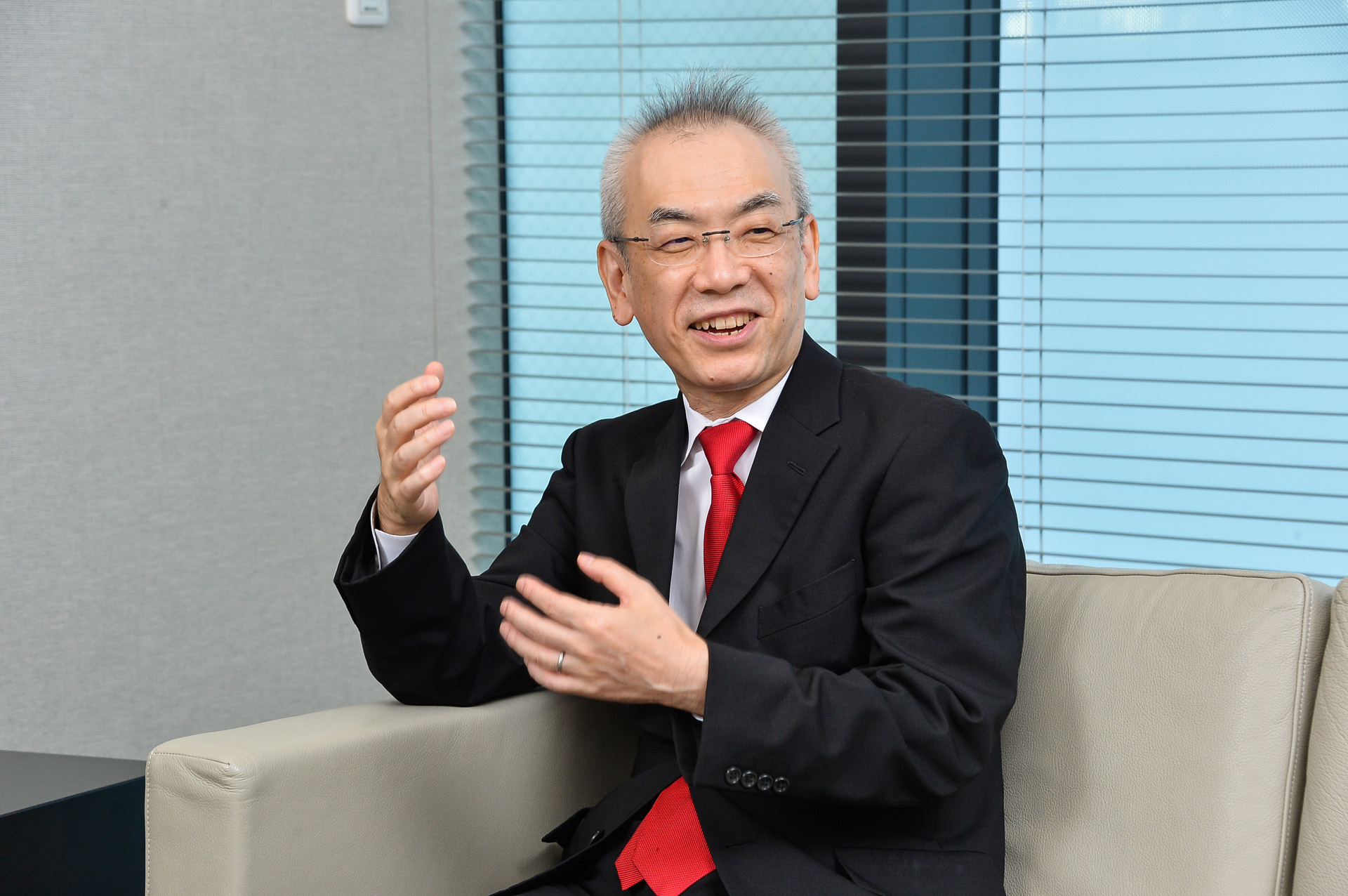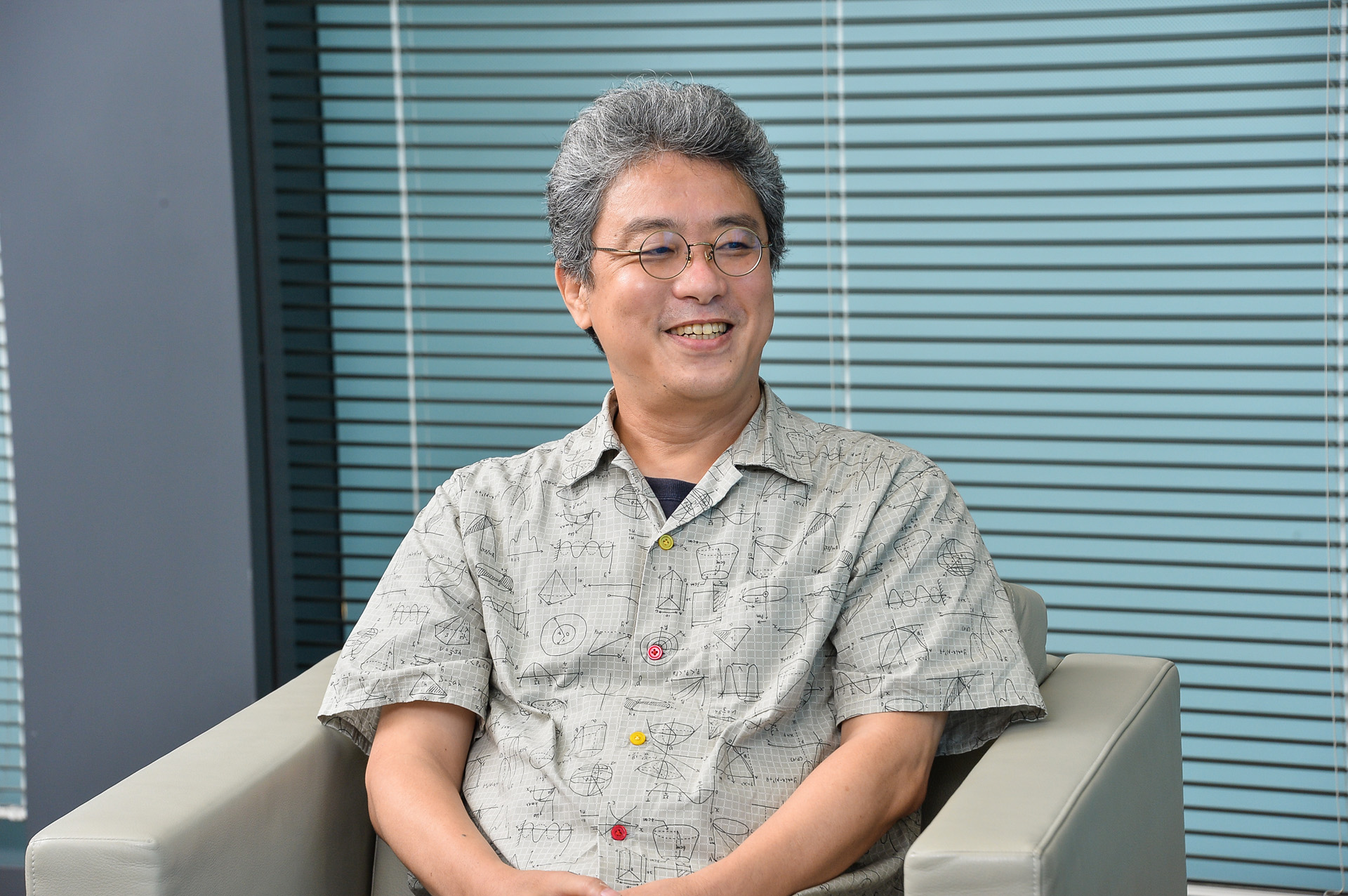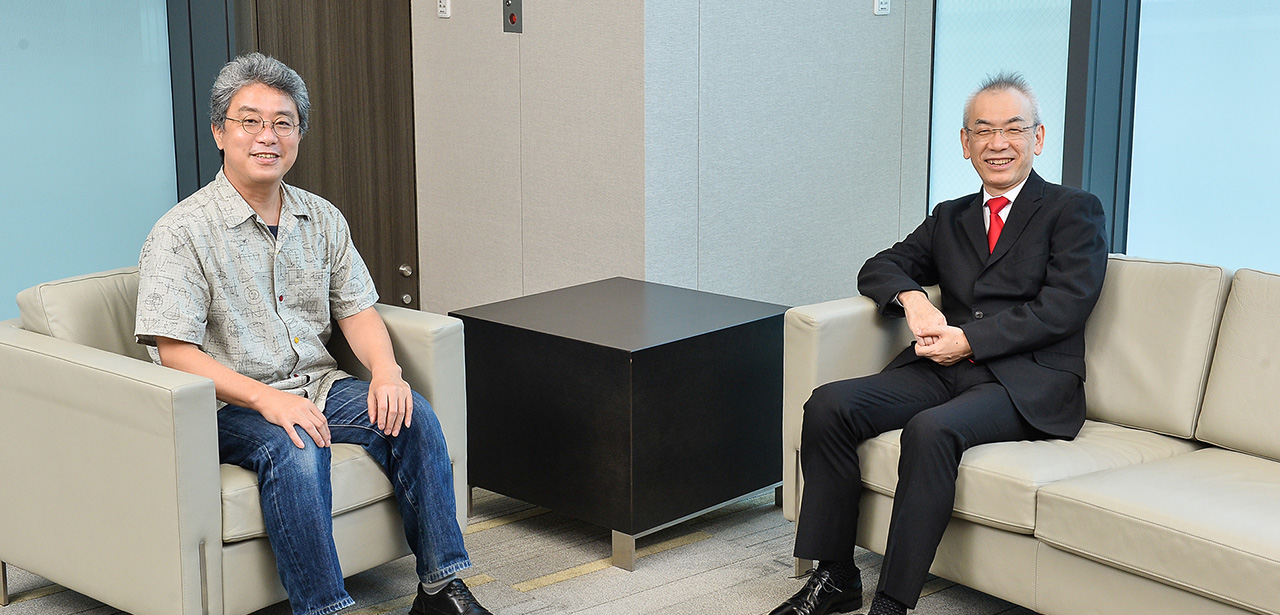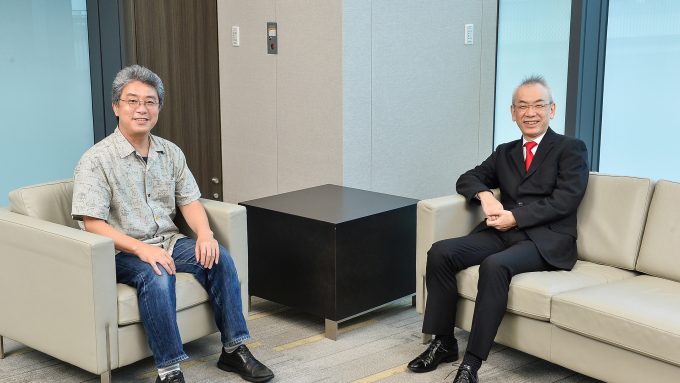“WE DISCUSS VANA’DIEL” is a series of conversations between Producer Matsui and special guests who are familiar with FINAL FANTASY XI (FFXI).
For our sixth guest, we invited Akitoshi Kawazu, the General Director of the SaGa series, who has been actively developing games since when the company was still known as Square. In this third part, we discussed the aspects necessary for MMORPGs such as FFXI, and learned more about the games Mr. Kawazu has worked on over the years.

Square Enix General Director of the SaGa series, who has been involved with the scenario, direction, and production of the series beginning with Makai Toushi SaGa* and Romancing SaGa. He has also been involved with the FINAL FANTASY (FF) series as a Game Designer in the original game and FFII, and as the Executive Producer of FFXII. He was also Producer Matsui's senior when they were enrolled at Tokyo Institute of Technology.
* Makai Toushi SaGa was released as The Final Fantasy Legend in North America.
The lack of an iconic character for FFXI
Mr. Kawazu, please tell us what you think is great about FFXI, or any aspects about the game you would want to change.
- Kawazu
There’s probably only good things to be said, considering numerous players have enjoyed the game for so long.
- Matsui
Are you sure that’s what you really think? (laughs)
- Kawazu
I really do mean it. With that said, FFXI does have to stay true to the FF series as one of its mainline titles, which might be constraining the game. But there isn’t anything I’d want to change about the game.
- Matsui
During our series of discussions with Mr. Kitase*, we spoke about how there are actually few constraints for the FF series and that future games should be made with more freedom.
* Yoshinori Kitase, Brand Manager of the FF series. - Kawazu
Back when FFXI was just released, Mr. Sakaguchi* and I were talking about how glad we were that so many players had joined us for launch. In that conversation, he also mentioned how the online multiplayer aspect was a success, and that the next steps would be deciding how to integrate an RPG-style story for the players to experience.
* Hironobu Sakaguchi, one of the founders of the FF series.
Games like FFXI and FFXIV seem like a blend of online game features and storytelling, but they present their stories differently from how standalone games do it. While MMORPGs absolutely don’t need to do things the same way, I’ve always felt it’s a shame that they don’t feature a character with a powerful presence, like Cloud (protagonist of FFVII). It can be hard for MMORPGs to create an iconic character that’s easily recognized by non-players.
- Kawazu
There isn’t really a character that’s like, “This is THE face of FFXI.” Of course, I’m sure FFXI players would be like, “But what about so-and-so character?!” but as someone who hasn’t played, there isn’t anyone that particularly sticks out to me. In that sense, I feel there still might be more for MMORPGs to accomplish. If there were a presence-heavy character, people who haven’t played yet might see them and think, “I wonder what game they’re from.” I think that’s what Mr. Sakaguchi meant when he mentioned his desire to “roll out the story well.”
Just like how everyone recognizes Cloud, even if they haven’t played FFVII.
- Kawazu
People across the globe were excited when Sora (protagonist of the Kingdom Hearts series) was recently announced for Super Smash Brothers Ultimate. It’d be nice to have a character that can attract that kind of attention.
- Matsui
Character impressions tend to be weaker in FFXI and FFXIV, where you’re always controlling your own avatar, compared to other FF titles where you’re always controlling the main protagonist.
- Kawazu
Even so, there are NPCs that get along with player characters, so if you could provide one with a powerful presence like Cloud’s, perhaps you’ll be able to push the game to a whole new level.
- Matsui
By the way, the SaGa series seems suitable for an MMORPG adaptation. Have you ever considered it?
- Kawazu
I get that from a lot of people. I wouldn’t want to do it myself, but it’d be fine if someone else wanted to make one for me. (laughs)
Considering how you feel about online games, I can understand why you’d keep your distance.
- Kawazu
ou’d need resolve in order to commit to something with no end in sight. I also feel it’d be really difficult to actually formulate the world I want to create.
* Tabletop role-playing games (TRPGs) are role-playing games that progress based on a rulebook and spoken events. In Japan, these are often referred to as “table-talk role-playing games” instead.
My roots are with a TRPG-style of flavor and enjoyment, so it’d be nice if I could find a way to express those elements in the medium. However, those elements would need to be modified to match the genre of MMORPGs, while also building upon what makes MMORPGs fun, and I’m not sure if that would go so well.

- Matsui
So instead of writing a story scenario, it’d be more like designing one big TRPG campaign.
- Kawazu
I suppose so...?
Although it’d be nice if every player could play a part in the story, it wouldn’t be very fun if you couldn’t play as your preferred role. In TRPGs, some people want to be protagonists, while others prefer to be a side character.
I prefer to be more of an observing character. I’d be like, “I don’t want to be in the spotlight, you guys can go kill the dragon. But if you screw up, the world might be doomed! I’ll be off to the side, providing support with my songs!”
It’d be nice if we could incorporate that kind of role-playing, but I just can’t come up with a good system for it. - Matsui
Maybe it could work if we used a game master AI? But that wouldn’t be quite the same.
TRPGs and MMORPGs seem to be similar in the sense that both are RPGs where you play with other people. What are your thoughts on that?
- Kawazu
TRPGs can’t be played without a group, so playing with other people is essentially one of the “rules.” It’s like how you can’t play mahjong without four people.
With online games, despite playing on a computer, you still have to get involved with other people. Why do I have to account for other people’s time, when I want to play right this minute? - Matsui
Although it’s become easier to play FFXI on your own, there still are aspects where you interact with other people, like when your leveling camp conflicts with another group.
- Kawazu
For example, I’m fine if defeating goblins requires six people, but I’d like to be matched with five other people instantly. Games like Fortnite puts teams together in a lobby, and each match doesn’t take too long. Unlike those kinds of games, where you can just win or lose and move on, MMORPGs require spending several hours with other players to defeat bosses, which is a bit of a hurdle for me.
- Matsui
Even FFXI back in the day required multiple hours just to form a leveling party. (laughs wryly)
- Kawazu
Games with automated matchmaking and matches that only take ten minutes or so are a wonderful invention. Regardless of what you think of the gameplay, it’s nice how the experience isn’t overly drawn out.
Behind-the-scenes of masterpieces by Mr. Kawazu
Mr. Matsui, do you have any examples of Mr. Kawazu’s work that left an impression with you?
- Matsui
I mentioned it briefly when we talked about the WonderSwan*, but I enjoyed Wild Card*. My WonderSwan was essentially dedicated to Wild Card. Romancing SaGa: Minstrel Song for the PlayStation 2 was also fun.
* WonderSwan is a handheld game console released by Bandai (as they were known at the time) in 1999. It was succeeded by the WonderSwan Color in 2000, which was capable of displaying color, then by SwanCrystal in 2002, which had an improved LCD screen.
I wonder how long ago that was? It feels really nostalgic, but at the same time fairly recent...
* Wild Card is an RPG released for the WonderSwan Color in 2001. Its defining characteristic is how the majority of game elements are represented as cards. - Kawazu
It was released in 2005, which would be 16 years ago.
- Matsui
It’s hard to believe it was so long ago. I’ve always wanted to see a sequel for it. More recently, the story for Romancing SaGa Re; universe* was really good. At first, I thought it was going to be a goofy story, but it became serious partway through. It’s rare for me to enjoy the story in a smartphone game. I really enjoyed it, and I’m curious what will happen next.
* Romancing SaGa Re; universe is a smartphone RPG title that was released in December 2018. The story is set 300 years after the events of Romancing SaGa 3.
Oh, and I’d like to take this opportunity to hear about FFII. People often say the odd-numbered titles in the FF series focus on the system (jobs) while the even-numbered titles focus on story, but that wasn’t the intention from the beginning, right? But even I saw it that way, and I believe FFII was a really important game that decided the direction of the games that came after. What are your thoughts, as someone who had an important role in FFII?

- Kawazu
Although we gained a lot of experience through making the first FF, it didn’t sell as well as we’d imagined. Mr. Sakaguchi also talked about how we learned what was necessary for making RPGs, so we should make something with more originality in the next one.
Is that what led to the dramatic elements of the story?
- Kawazu
Beginning the game from utter defeat was something we decided relatively early on. Like that, our theme with FFII was to do something that other games may have never done before, and Mr. Sakaguchi had even suggested a “city adventure” type of game that would entirely take place in a single city.
I was also surprised that the concept of levels was removed* in FFII. On top of that, I think a lot of players at the time started the game by attacking their allies to increase their HP, but I remember being blown away when I later learned that relying on evasion made it much easier to play.
* In FFII, characters don’t level up; instead, their HP increases when taking damage during battle, and using weapons and spells increases their potency.- Matsui
It’s best if you fight with a shield. Whenever I play, I sell Minwu’s ethers and use the gil to purchase the Silver Breastplate. Armors that reduce your evasion are a trap so I don’t buy those. From there I’d farm Ogre Mages to earn gil and increase magic defense, then finally set out on my journey.
* The Word Memory System is a feature in FFII where you can “Memorize” keywords from conversations and bring them up in conversations with other NPCs using the “Ask” command.
Aside from that, back then, I was really impressed by the Word Memory System*. Ah, you’re talking about “wild rose.”
- Matsui
I remember being really happy when I said ”wild rose” to Hilda and she acknowledged me. When I saw that, I felt like the FF series had endless potential.
As for the SaGa series, I thought it was interesting how choices weren’t “Yes” or “No,” but dialogue instead. - Kawazu
That must’ve been based on my experience with TRPGs.
- Matsui
If it weren’t for those memorable moments, I may not have tried to join the game industry, and I may not have ended up working at Square. They showed me the wonders you could do with NES games. The same goes for the SaGa series on the Game Boy. Not only did they allow you to play RPGs on a handheld console, they allowed you to save or pause anywhere, and I just couldn’t put down a marvelous game like that.
- Kawazu
It didn’t make sense to me how other games were so focused on having save points when it’d be more convenient if you could save anywhere. With that said, allowing the player to save anywhere is difficult to implement.




